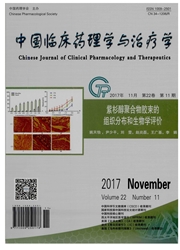

 中文摘要:
中文摘要:
目的研究院前亚低温对重型颅脑损伤患者的脑保护作用。方法将由急救车送至本院的86名重型颅脑损伤患者采用随机数字表法随机分成两组:院前亚低温组和晚期亚低温组。院前亚低温组患者入院前保持患者鼻咽部温度33℃~35℃,入院或手术后改为亚低温治疗仪(降温毯)进行亚低温治疗4天后自然复温。晚期亚低温组患者在人院或手术后开始使用亚低温治疗仪进行同样的亚低温治疗作为对照。同时监测两组的脑温、生命体征、颅内压力、并发症和GOS评分。结果院前亚低温组在治疗后24、48和72h的颅内压分别为(17.38±4.88mmHg,18.40±4.50mmHg,16.40±4.13mmHg)均较晚期亚低温组(20.63±3.00mmHg,21.80±6.00mmHg,18.81±4.50mmHg)明显降低(P〈0.05);院前亚低温组恢复良好率、病死率与晚期亚低温组相比较有显著差异(P〈0.05),预后(GOS评分4~5分)明显好于晚期亚低温组(P〈0.05);院前亚低温组未发生与亚低温治疗相关的严重并发症。结论院前亚低温用于重型颅脑损伤患者的治疗,具有降低颅内压、改善预后的作用。
 英文摘要:
英文摘要:
Objective To investigate the cerebral protection of pre-hospital mild hypothermia treatment on patients with severe traumatic brain injury (TBI). Methods Eighty-six patients with severe traumatic brain injury were randomly divided into the pre-hospital mild hypothermia treatment group (43 cases) and late period mild hypothermia treatment group (43 cases). The patients in pre-hospital mild hypothermia treatment group were kept the temperature of nasopharynx department at 33 -35℃ before they arrived at hospital, and then two groups were treated with therapeutic mild hypothermia for four days. Ultimately, they were recovered to normothermia naturally. Meantime, brain tissue temperature (BT), the vital sign, intracranial pressure (ICP), complication, Glasgow Outcome Scale (GOS) were measured respectively. Results In comparison with the control group, the ICP of the pre-hospital mild hypothermia treatment group was significantly decreased (P 〈 0.05). The good recovery, decreased mortality and good prognosis were also found in the prehospital mild hypothermia treatment group (P 〈 0.05). In addition, the pre-hospital mild hypothermia treatment group hadn' t significant complications related to the mild hypothermia treatment. Conclusion The pre-hospital therapeutic mild hypothermia can effectively reduce the ICP of patients with severe traumatic brain injury and improve the prognosis.
 同期刊论文项目
同期刊论文项目
 同项目期刊论文
同项目期刊论文
 期刊信息
期刊信息
